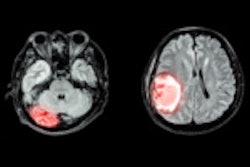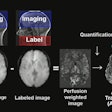SINGAPORE – A higher body mass index (BMI) translates to poorer brain health in the form of premature aging, according to research presented May 7 at the International Society of Magnetic Resonance in Medicine (ISMRM) meeting.
Presenter Han Lv, PhD, of Beijing Friendship Hospital in China and colleagues found high BMI to be causally associated with smaller brain volume and abnormal microstructural integrity in projection fibers, especially in adults under the age of 45.
The causal relationship between BMI -- a modifiable factor associated with poor cardiovascular health -- and brain health is unclear, Lv's group noted. The team performed a study to explore the effect of BMI on neuroimaging features in adults of different ages and verify the causal relationship. It based the research on information from the KaiLuan study, which began in 2006 and consists of data from 681,275 individuals; this work included participants who visited the hospital at least three times and underwent brain MRI examination, with no evidence of dementia or mental disorders. Starting in 2020, patients received 3-tesla MR imaging for volumetric measurements of the brain structure, white-matter hyperintensity, and skeletonized white-matter tract at the voxel level.
Lv's and colleagues' study included data from 1,074 adults between the ages of 25 and 83. Overall, they found that high BMI was associated with a wide range of negative brain health effects. They also reported the following:
- Differences in cerebral parenchyma volume between those adults under 45 years of age with a BMI > 26.2 kg/m2 corresponded to 12 years of brain aging compared to those with a normal BMI.
- Differences in white matter hyperintensities were statistically significant for participants over the age of 60 with a high BMI, with a 6-ml larger volume.
- Genetic analysis showed causal relationships among high BMI values, smaller volume of the cerebral parenchyma and gray matter, and higher fractional anisotropy in projection fibers.
The bottom line? The study results underscore a need to develop and encourage interventions for patients with high BMIs, according to the researchers.
"These findings provide a basis for future brain health promotion and disease prevention strategies," they concluded.



















